Mahila Kisan Sashaktikaran Pariyojana was launched in 2011 to help & extend support to women farmers who make up for one-third of the agricultural labour and almost a half of the self-employed farmers. Here is an explainer of the scheme.
Women empowerment is a key driver of development. Various governments have over the years initiated different schemes aimed at improving socio-economic and health standards of women.
The case for intervention is acute in rural India, where women face discrimination on various fronts and be a part of the workforce.
Agriculture is the largest employer of women with 80% of economically active women being engaged in agriculture. Further, women comprise 33% of the agricultural labour force and 48% of self-employed farmers.
A sizeable portion of farm households are female headed (16%), especially in cases of widowhood, male-migration etc. In spite of being a key part of the agriculture, women face discrimination in terms of lower wages than man, not having access to various agricultural support systems etc.
It is in this context that the Government of India launched the Mahila Sashaktikaran Pariyojana (MKSP) in 2011 under National Rural Livelihood Mission (NRLM). It is currently being run under Deendayal Antodaya Yojana – NRLM (DAY-NRLM). The primary objective is to improve the status of women in agriculture and to provide opportunities to enable her.
Sustainable Agriculture based livelihoods for rural women is key objective of MKSP
MKSP aims to empower women in agriculture by making systematic investments which encourages their participation and increases the productivity. It also focuses on creating and sustaining agriculture-based livelihoods for rural women. Another key objective of the MKSP is to provide women involved in agriculture and related activities access to various information sources and support mechanisms, to gain sustained longer-term benefits.
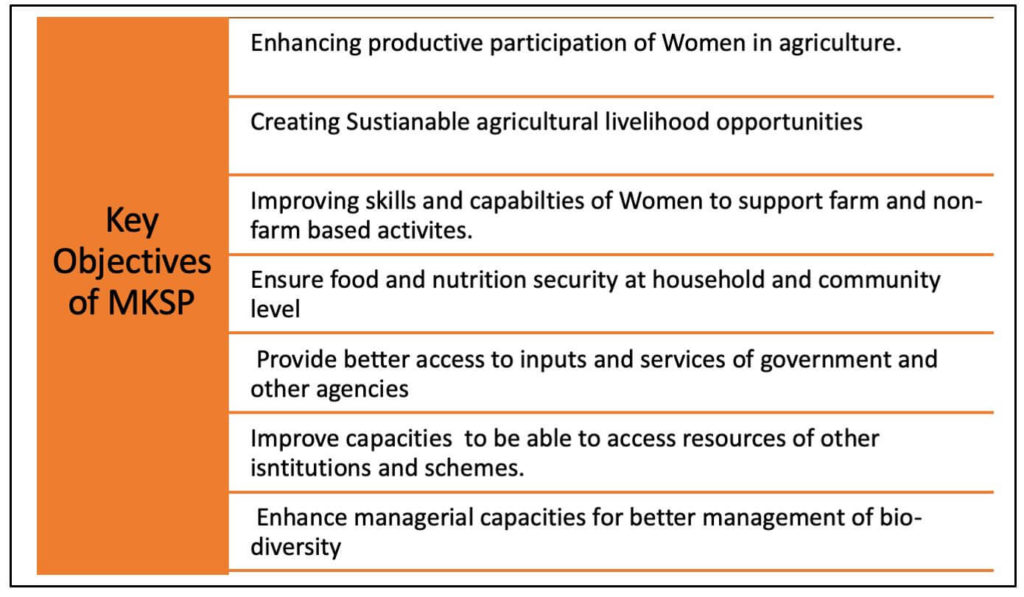
In addition to these objectives, certain expected outcomes are laid out to measure the success of any of the programmes or interventions under MKSP.
Few of the important outcomes include: increase in the incomes of the women, improving food and nutritional security, increasing area under cultivation, increase in the skills, reduction of drudgery through enhanced tools & technologies, increasing the visibility of women, develop entrepreneurship etc.
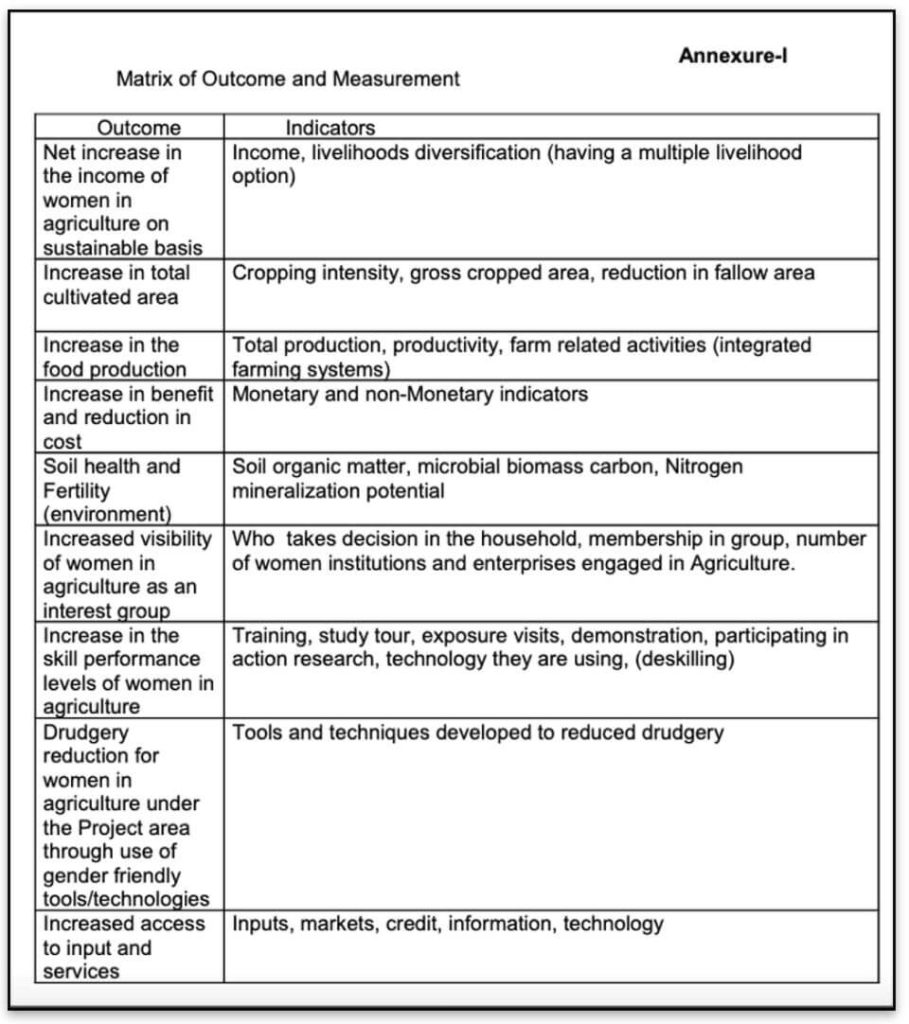
Sustainable Agriculture & Value Chain Development among key focus areas of MKSP
Various programmes and interventions are initiated under MKSP to assist women involved in Agriculture. These programmes are categorized under the following three components.
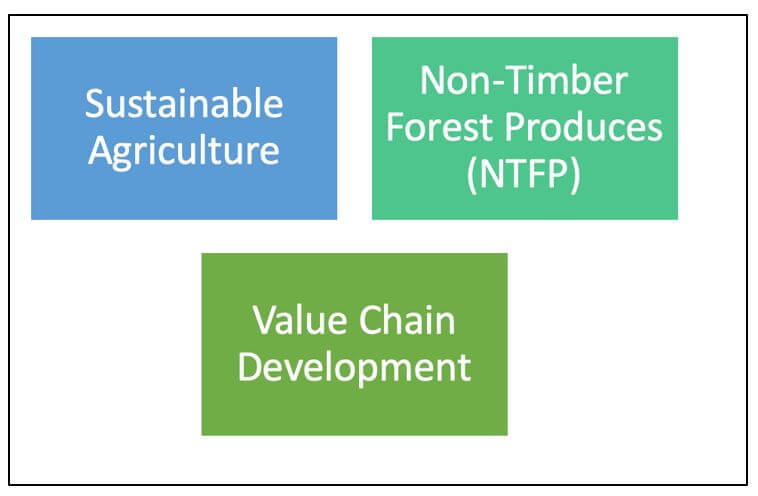
Interventions which are related to livestock are integrated into both Sustainable Agriculture and NTFP projects. The following are some of the key interventions under each of these programmes.
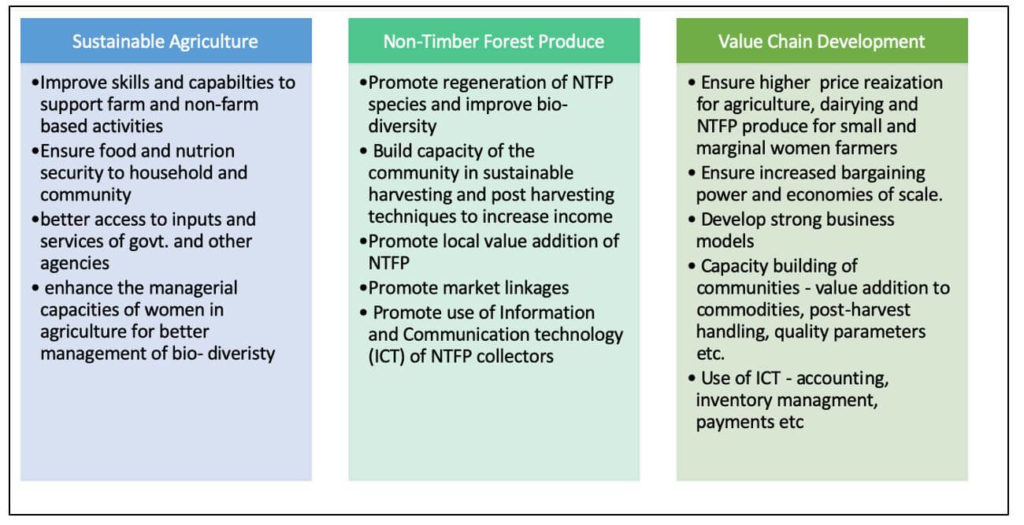
What is the implementation approach of Projects under MKSP?
All the projects under MKSP are aimed at providing direct and indirect support to women involved in agriculture and related activities. Various programs are formulated in partnership with skills development organizations, NGOs etc who are working in this space.
The Project Implementing Agency (PIA) oversees the planning and implantation of the various programmes under MKSP. The strategy of PIA involves:
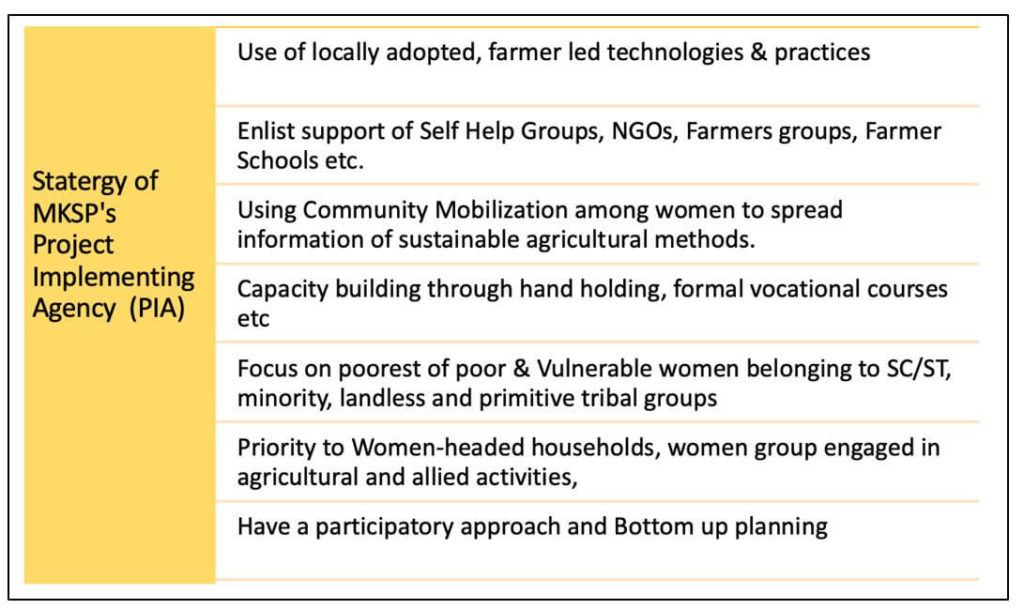

Any project which is to be implemented under MKSP goes through multiple stages , from the stage of identifying the need and developing a proposal to implementing the approved project and completing it. Multiple government and private partners are involved during this process.
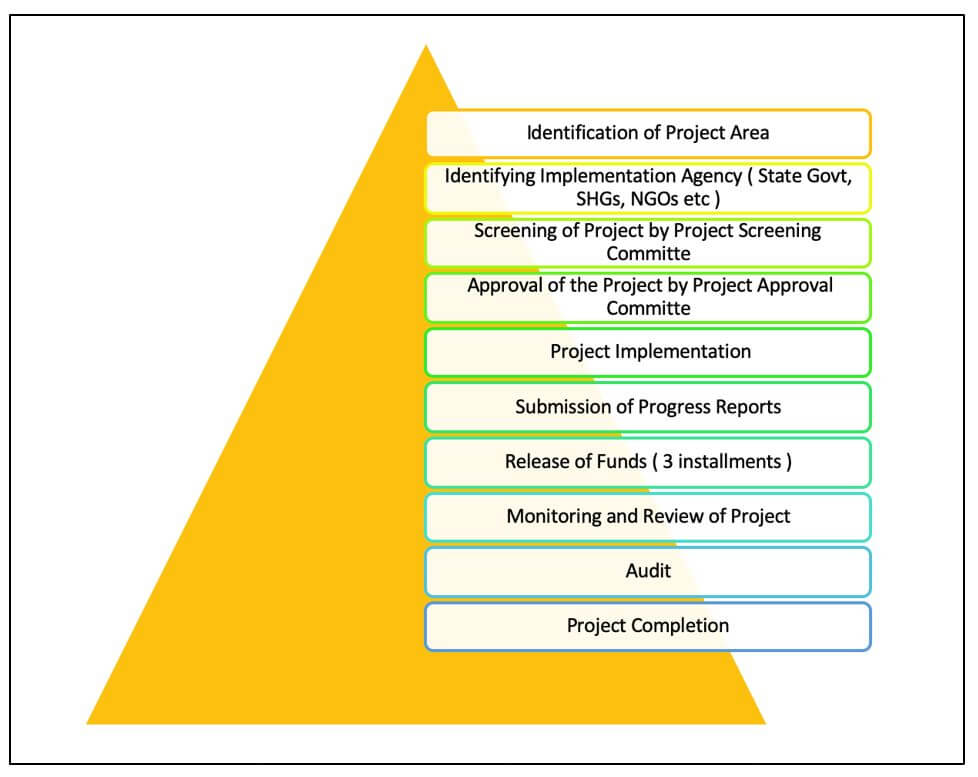
Government has collaborated with multiple organizations for effective implementation and intervention. These organizations are involved in multiple stages including planning, intervention and implementation.
Responding to a question in Lok Sabha on 19 November 2019, Union Minister of Rural Development provided the list of organizations with whom the government is collaborating for the implementation of MKSP.

More than 36 lakh Mahila Kisans benefited through various projects under MKSP
As per the information provided by the government in the Lok Sabha on 19 November 2019, there are a total of 84 projects sanctioned under MKSP across 24 states.
Out of the 273 districts targeted, projects under MKSP have been implemented in 238 districts.
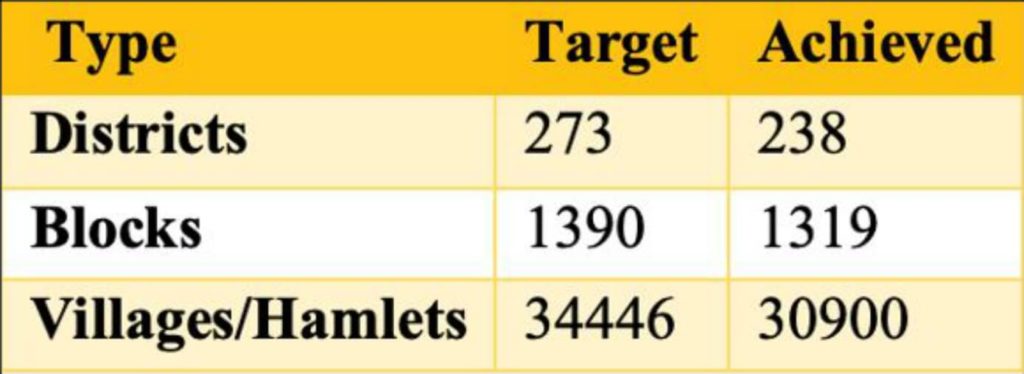
More than 33.81 lakh Mahila Kisans were targeted to benefit from the 84 projects sanctioned under MKSP. As per the information provided in Lok Sabha, the projects have overachieved the targets in terms of the number of women who benefitted from the project. A total of 36.06 lakh beneficiaries are covered under these projects. The central government has allocated Rs. 847.5 crores for the approved projects of which Rs. 579.8 is already released as on 30 September 2019.
The higher numbers are primarily due to Andhra Pradesh and Kerala where the achievement is far greater than the target.
The States of Arunachal Pradesh, J&K, Nagaland etc did not implement any of the projects with no Mahila Kisans benefitted from these projects.
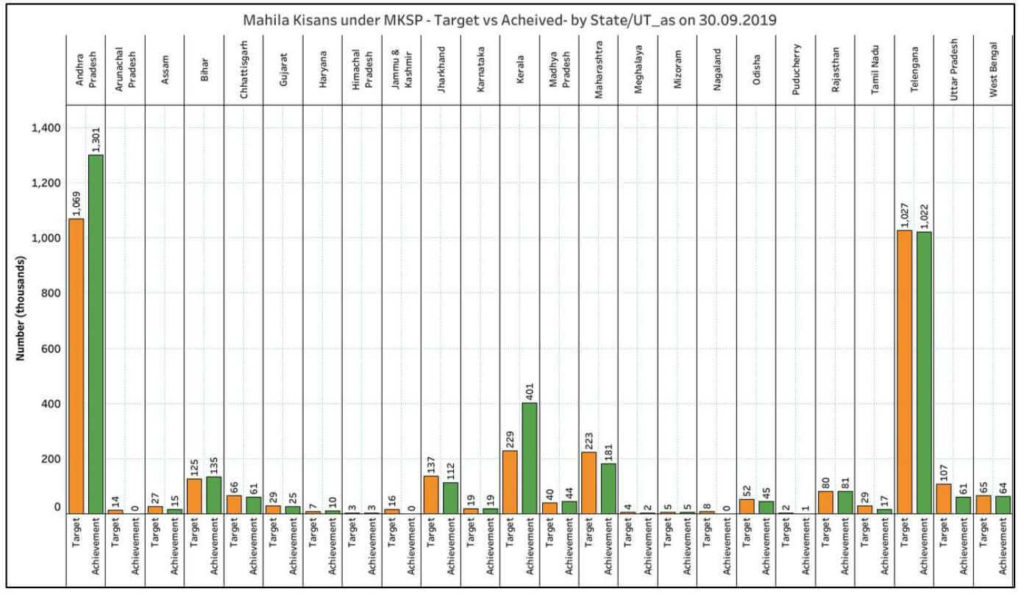
Uneven distribution of the projects across the country
The distribution of the projects and thus the districts and villages covered under the scheme is uneven across the country. Out of the 84 sanctioned projects, Andhra Pradesh (14), Jharkhand (11), Telangana(10) and Odisha (9) have a major share. More than 50% of the projects under MKSP are being implemented in these four states.
Even from a target achieved perspective, the performance is not even across the country. Most of the states where the projects have been sanctioned have not met the specified targets.
Andhra Pradesh, Kerala, Bihar and Telangana are the states which have managed to perform better with AP & Kerala achieving beyond the set target.
While the number of beneficiaries is available on the MKSP MIS portal, details of the project area, outcomes as against the project goals are not available. Availability of such information in the public domain will allow for an objective evaluation of the scheme.
Featured Image: Mahila Kisan Sashaktikaran Pariyojana


